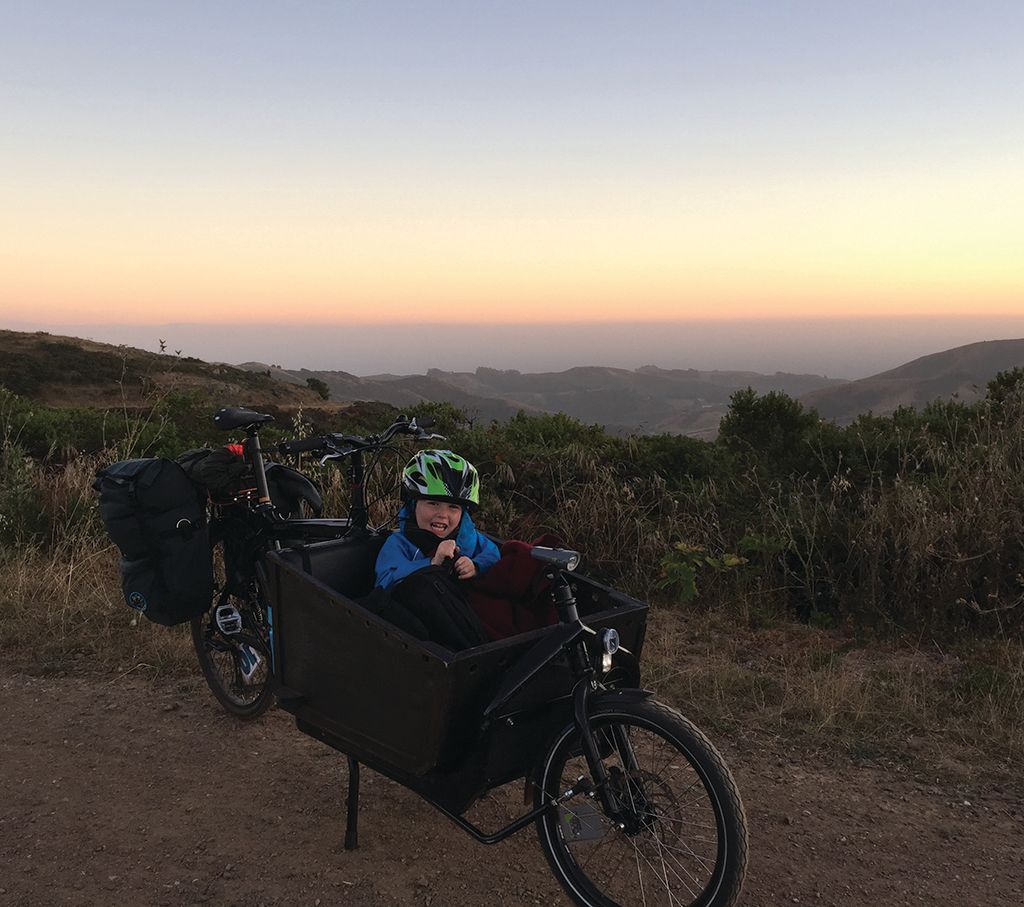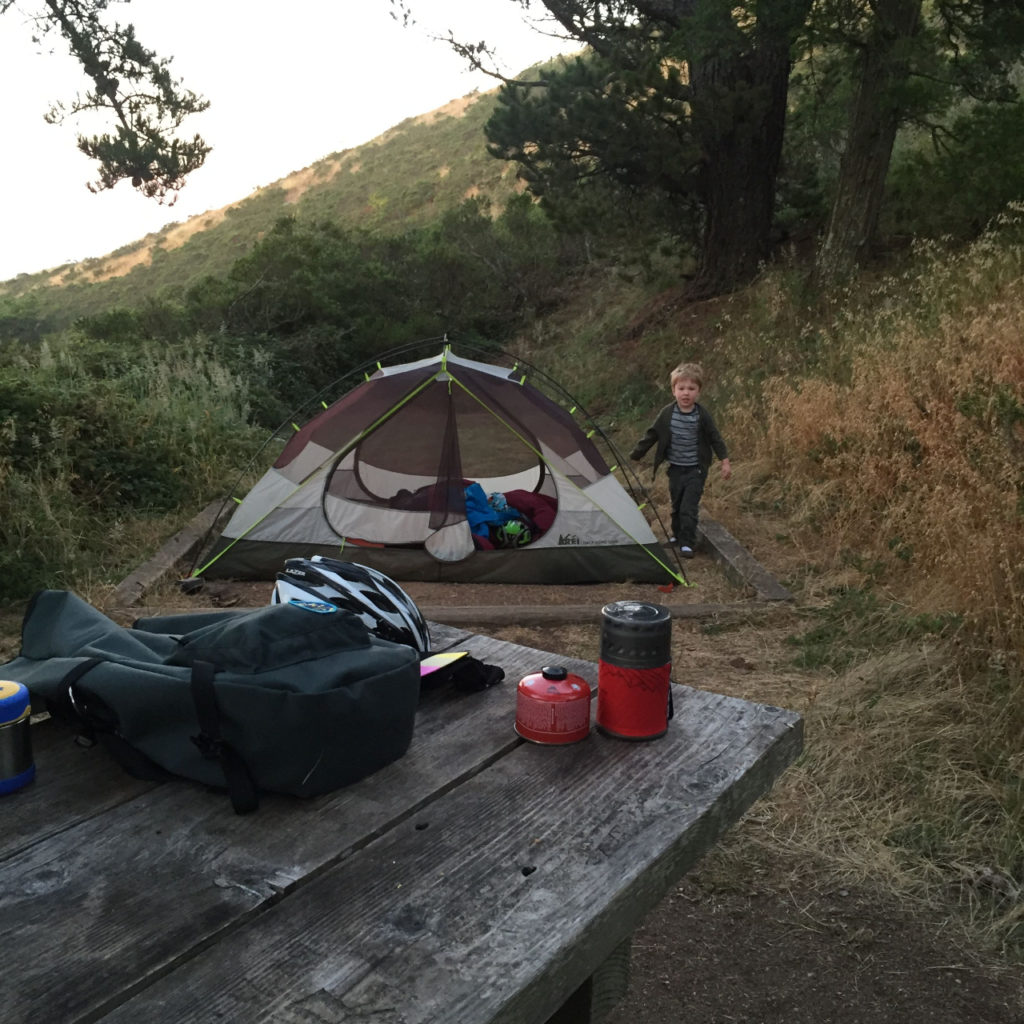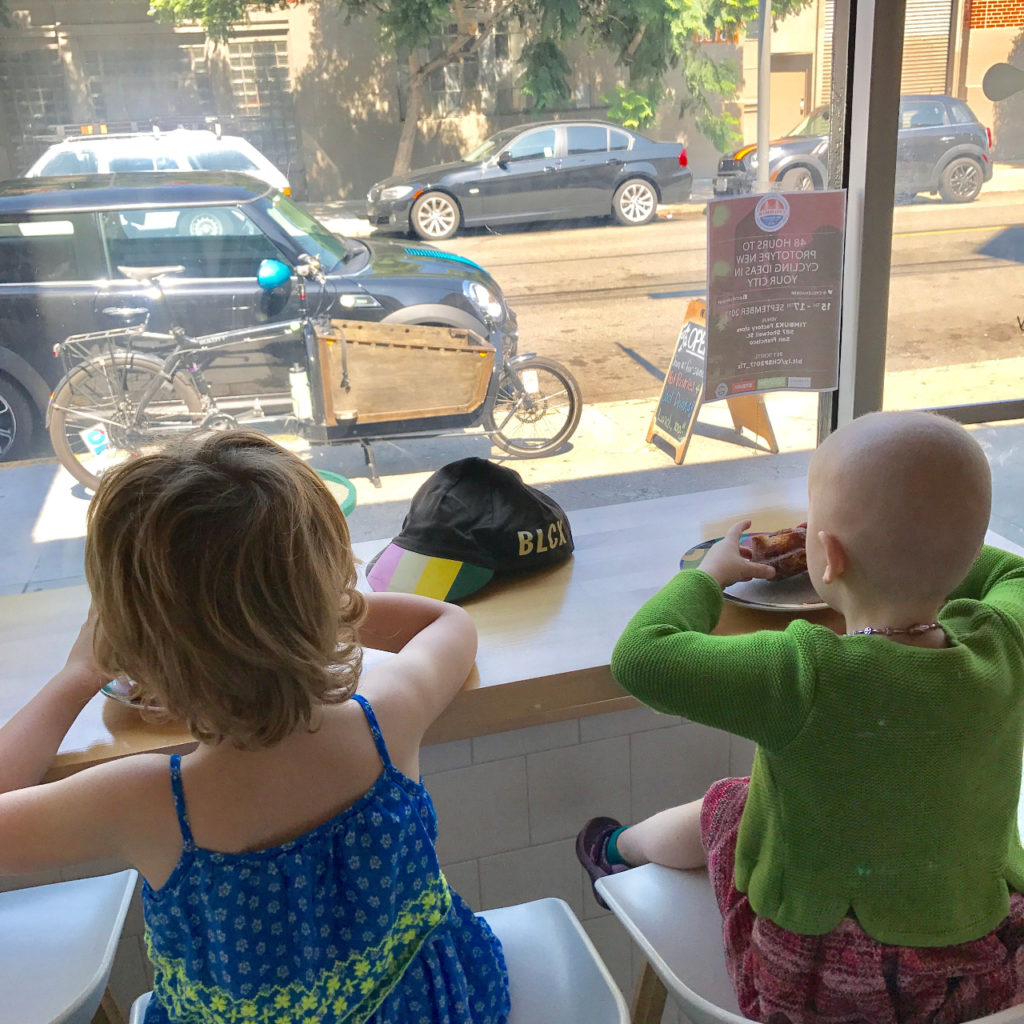On the Road: Agent of Change
Miles Cooper’s reflections on a cargo bike, childhood cancer, and the road ahead
The bike rolled strong, holding its line in the bike lane as it bombed down the hill. The aluminum frame and quick, if quirky, handling belied the obvious — it was a cargo bike. Despite its 65-pound build, the Bullitt bike felt sporty, making even errands fun. The frame, built by the seriously silly Danish company Larry versus Harry, was what is known as a box bike. Ours included a wooden box containing a bench seat and side-by-side harnesses for our two kids.
 Sunset at the turnoff to Hawk Camp.
Sunset at the turnoff to Hawk Camp.
No kids were with me today, however. It was pandemic Groundhog Day Number Umpteen-and-then-some, with this being the weekly Thursday outing day. Errands and check-signing at the empty office, our army long ago decamped to myriad home workspaces. I rode in the current style, mask on, sunglasses gone, having yet to figure out how to wear glasses without the latter fogging over. Instead of kids, the wooden box held three garbage bags stuffed with the results of decluttering projects. A Goodwill drop-off was a planned detour on the way to the office.
Riding afforded me the luxury of escaping into my head. Being on the cargo bike, the escapes that morning were reflections upon past outings. The crisp weather made me long for outdoor adventure, bringing back a memory of doing just that with our son.
Escape from San Francisco
Immediately north of San Francisco sits a vast open space called the Headlands. This former military base once housed anti-ship artillery and nuclear-tipped Nike missiles. As we humans innovated, developing better ways to slaughter each other, the base became obsolete and was transferred to the National Park Service. Aries’ discards became a playland across the bridge for San Francisco’s outdoorsy set. Nestled within the Headlands are a few hike-in/bike-in campsites. When our son was still little, in pre-school, I asked him if he was interested in taking the cargo bike to one of the campsites. Surprising no-one, he loved the idea.
We secured a weekday space at Hawk Camp, a quiet spot high in the hills with a bridge tower view. Weekend spots are hard to get. That’s one of the amazing attributes the Headlands afford — the ability to leave the City, sleep outdoors, and be back for school and work the next day.
I picked Bennett up from pre-school, the bike already loaded. San Francisco’s evening 20-mile-per-hour winds and fog were kicking in, so I tucked a blanket around him and handed him a snack. Our dinner-in-foil burritos had already been packed up for us to eat later. We made our way through the Panhandle and the Presidio, Bennett peppering me with questions about tent set up. As we crossed the bridge, the west winds pummeled us and the conversation died down. Despite the cold wind, Bennett did not complain.
We reached the Headlands, rode through the tunnel, and then turned onto a fire road to access the campsite. The road up to Hawk Camp skirted the southern edge of a protected valley, the valley’s ridgeline diminishing the wind. We chatted as stones crunched under the tires. There’s a short steep section where I was unable to turn over the pedals. Bennett hopped out and we walked the section together, Bennett offering the best assistive pushing a boy his size could muster. When we reached a point where I could again pedal, I rewarded him with one of the sweeter snacks I had squirreled away.
 Setting up camp.
Setting up camp.
Once we reached camp, Bennett sprung into action and set up the tent. After we ate and bedded down, he immediately fell asleep, exhausted. Nestled against me, I held him, wondering at his calm. Within a few minutes, the sound of his quiet breathing was joined by howls from a coyote pack down in the valley below.
We woke with the sun the next morning. Bennett broke down camp while I made cocoa, coffee, and oatmeal. We loaded the bike and reversed course. As we crossed the bridge, the occasional bike commuters who passed us offered kind words. We pulled up at the pre-school a few minutes late. I gave Bennett a hug and sent him in, our overnight adventure complete. I took pleasure in our ride, and yet also did not fully appreciate how lucky we were to be able to have that experience. I did not recognize the importance of living in the moment. And I certainly could not contemplate what lay ahead.
Dropping off
My past ride reverie was interrupted as I re-focused on my errand. Waxing poetic about living in the moment, and yet I reflected on the past instead of my surroundings. Zen as I say, not as I do.
I made a left and rolled up to the Goodwill drop-off. As with so many other pandemic patterns, we were not the only people taking advantage of the opportunity to Marie Kondo our house. Six cars idled in front of me, waiting for room to park and drop off materials. The bike did not need a parking space however, and I got waved in. Within two minutes I had dropped my bags in the appropriate bins and was back on the road. Yet another shortcut made possible by the cargo bike. I turned right on 16th Street, crossed the train tracks, and rode past the relatively new UCSF medical complex. The hospital, where we now take our daughter for regular (fingers crossed no) cancer screenings, brought forward memories of different cargo bike rides.
Cancer by bike
While it had been a few years, riding by a hospital could not help but stir cancer memories, when the cargo bike’s main function was to ferry our then three-year-old daughter back and forth for treatment. Clinic visits. 72-hour admissions for monthly chemotherapy. And two weeks later, fever readmissions of unpredictable length, ranging from two to four days. Her white blood cells plummeted to zero, decimated by the same chemicals sent to kill the cancer. She’d then spike a fever and they’d infuse her with broad-spectrum antibiotics to fight off potential infections.
The fever picked its time, invariably late at night. Once it hit 102 degrees, it was time to go. The December fever spiked at its typical late hour, Maryanne noting its arrival and giving me a nudge. I got out of bed and packed the panniers. We waited until the last minute before disturbing Dylan’s sleep. Cradling her frail frame, I made sure to collect her pump and the liquid nutrition that got pushed through the hose snaking through her nose and throat directly to her stomach. She eventually learned to insert the tube herself, since every chemo-induced vomiting episode sent it up from the stomach and out her mouth. She decided it was better to cough and gag on her own terms rather than have a parent and two nurses force it down her throat. Tough as nails, that girl. But I digress.
Despite our best efforts, the crisp December night air woke Dylan up. Nestling her in the cargo bike’s box, I clipped her in and then tucked a rough woolen blanket around her. We said our goodbyes — would this admission be two days, four? Who knew? We set off. Why does that particular night stand out? Perhaps it was the unscheduled holiday lights tour. As we rode through the quiet streets, we passed various houses and their light displays. Dylan commented on ones she particularly liked. Had this been a normal year there was little chance she would have been up late enough to experience the joy those lights brought her. Even with a fever, Dylan made good conversation. The time with adults and her old-soul nature led to a robust vocabulary. And a preternatural inquisitiveness.
For that was the other memory that stuck out about our ride. We never told her the statistics, that only 37% of the children with her very rare cancer survived. We also never lied when she asked questions. As we headed up a short climb, looking at lights and talking about various things, she asked for the first time if she was going to die. I took advantage of being out of breath to cover the emotion in my voice.
“We’re doing everything in our power to make sure that doesn’t happen,” I huffed, “as are you.” For she was. A force to be reckoned with — heaven help anyone who gets in her way. We crested the rise and picked up speed on the downhill section. Her attention shifted to something else. The headwind blew tears back toward my ears. We arrived at the hospital, locked up the bike, and trundled into the hospital where everyone knew our names.
 The good days frequently included a pastry stop.
The good days frequently included a pastry stop.
Check, please
My attention snapped back from cancer memories to the errand at hand — check-signing at the office. As I approached the bay, I turned left. The City was slowly connecting the various waterfront bike paths, making this a nice way to head north. Passing by the empty basketball stadium, the empty ballpark and innumerable boarded-up businesses, I wondered about the future. With hard work and good fortune, our daughter survived and thrives. With hard work and good fortune, we were able to pivot the firm during the pandemic, continuing to help our clients with an at-home workforce.
Cancer formed a crucible that tested our family’s mettle, and we came out the other side stronger than before. We were tremendously fortunate — our daughter lived. I would never wish the experience on anyone, and yet I am grateful for its lessons.
Now, the pandemic is testing everyone. With it, everyone faces unique challenges. Some hardships are far, far worse than others. Some people won’t survive. For those who remain, the world will be different. The societal, economic, and political impacts cannot be underestimated. We can approach this change with dread or treat it as a new day, a new dawn. We can pull together and lift others up or we can tear ourselves down. We must believe that we will absolutely, positively, get through this. And yet we must acknowledge the tremendous challenges in the moment.
That dawn will arrive. Look for hints of it in small victories along the way. Know that sun will be cresting soon.
Have you or someone you know been involved in a bicycle crash? Curious about your rights? Are you a lawyer handling a bicycle crash who wants more information on how to get the best result for your client? Contact Bicycle Law at (866) 835-6529 or info@bicyclelaw.com.
Bicycle Law’s Bob Mionske is licensed to practice in Oregon, its affiliate Coopers LLP has lawyers licensed in California, and either can affiliate with local counsel on bicycle cases across the country to make sure cyclists get the benefit of lawyers who focus on the issues specific to bicycle incidents.
